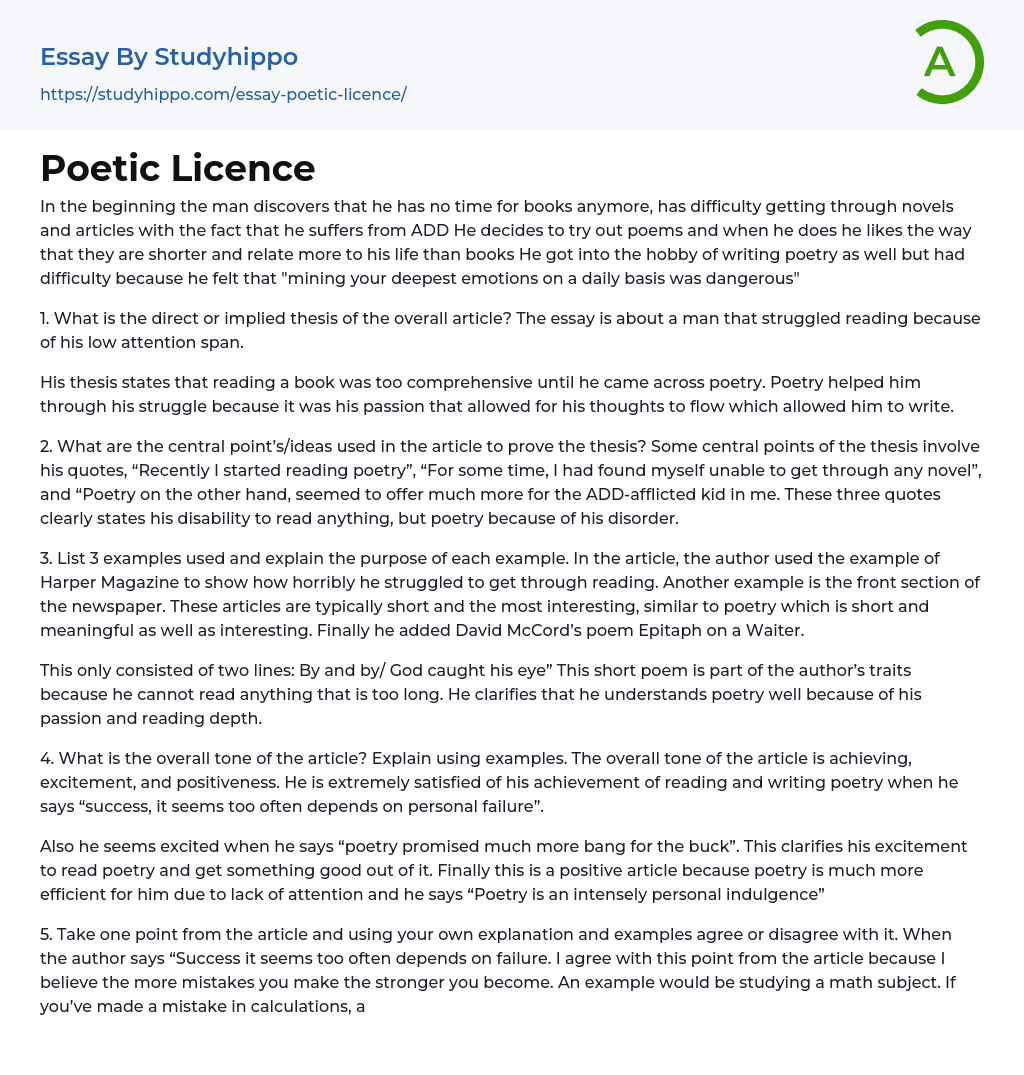In the beginning the man discovers that he has no time for books anymore, has difficulty getting through novels and articles with the fact that he suffers from ADD He decides to try out poems and when he does he likes the way that they are shorter and relate more to his life than books He got into the hobby of writing poetry as well but had difficulty because he felt that "mining your deepest emotions on a daily basis was dangerous"
1. What is the direct or implied thesis of the overall article? The essay is about a man that struggled reading because of his low attention span.
His thesis states that reading a book was too comprehensive until he came across poetry. Poetry helped him through his struggle because it was his passion that allo
...wed for his thoughts to flow which allowed him to write.
2. What are the central point’s/ideas used in the article to prove the thesis? Some central points of the thesis involve his quotes, “Recently I started reading poetry”, “For some time, I had found myself unable to get through any novel”, and “Poetry on the other hand, seemed to offer much more for the ADD-afflicted kid in me. These three quotes clearly states his disability to read anything, but poetry because of his disorder.
3. List 3 examples used and explain the purpose of each example. In the article, the author used the example of Harper Magazine to show how horribly he struggled to get through reading. Another example is the front section of the newspaper. These articles are typically short an
the most interesting, similar to poetry which is short and meaningful as well as interesting. Finally he added David McCord’s poem Epitaph on a Waiter.
This only consisted of two lines: By and by/ God caught his eye” This short poem is part of the author’s traits because he cannot read anything that is too long. He clarifies that he understands poetry well because of his passion and reading depth.
4. What is the overall tone of the article? Explain using examples. The overall tone of the article is achieving, excitement, and positiveness. He is extremely satisfied of his achievement of reading and writing poetry when he says “success, it seems too often depends on personal failure”.
Also he seems excited when he says “poetry promised much more bang for the buck”. This clarifies his excitement to read poetry and get something good out of it. Finally this is a positive article because poetry is much more efficient for him due to lack of attention and he says “Poetry is an intensely personal indulgence”
5. Take one point from the article and using your own explanation and examples agree or disagree with it. When the author says “Success it seems too often depends on failure. I agree with this point from the article because I believe the more mistakes you make the stronger you become. An example would be studying a math subject. If you’ve made a mistake in calculations, and correct yourself, it is rare you will make the same mistake.
6. The last line of "Poetic License" states, "success, it seems, too often depends on personal failure". The
essayist calls this statement IRONIC. Explain what he means in relation to poets.
Ironic means something that happens that is expected to be the opposite. In relation to poets, some feel emotion behind what they are or do in life. Some are depressed, angry or scared and these feelings can be based on failures from their lives. These emotions help motivate speech and poetry which makes their writing pieces truly great and filled with heart.
7. Identify and explain the following terms from the article: Point of View: the perspective of the article. Ex. in the article it was first person (me, myself, I)
- Pressure essays
- Confidence essays
- Disgrace essays
- Lost essays
- Harmony essays
- Fairness essays
- Sarcasm essays
- Respect essays
- Responsibility essays
- Empathy essays
- Suffering essays
- Suspense essays
- Fear essays
- Feeling essays
- Loneliness essays
- Ambition essays
- Tolerance essays
- Hope essays
- Inspiration essays
- Kindness essays
- Shame essays
- Desire essays
- Doubt essays
- Grief essays
- Hate essays
- Laughter essays
- Passion essays
- Pride essays
- Forgiveness essays
- Happiness essays
- Humanity essays
- Loyalty essays
- Guilt essays
- Honesty essays
- Betrayal essays
- Need essays
- Boredom essays
- Courage essays
- Regret essays
- Anger essays
- Honor essays
- Honesty Is The Best Policy essays
- Book Summary essays
- Metaphor essays
- Reader essays
- Rhyme essays
- Literary devices essays
- Villain essays
- Books essays
- Genre essays




